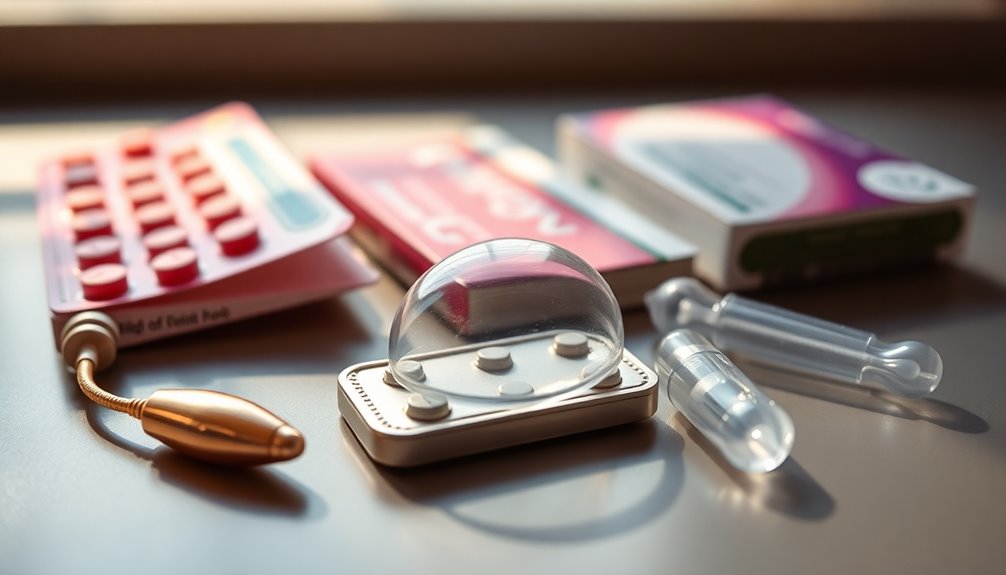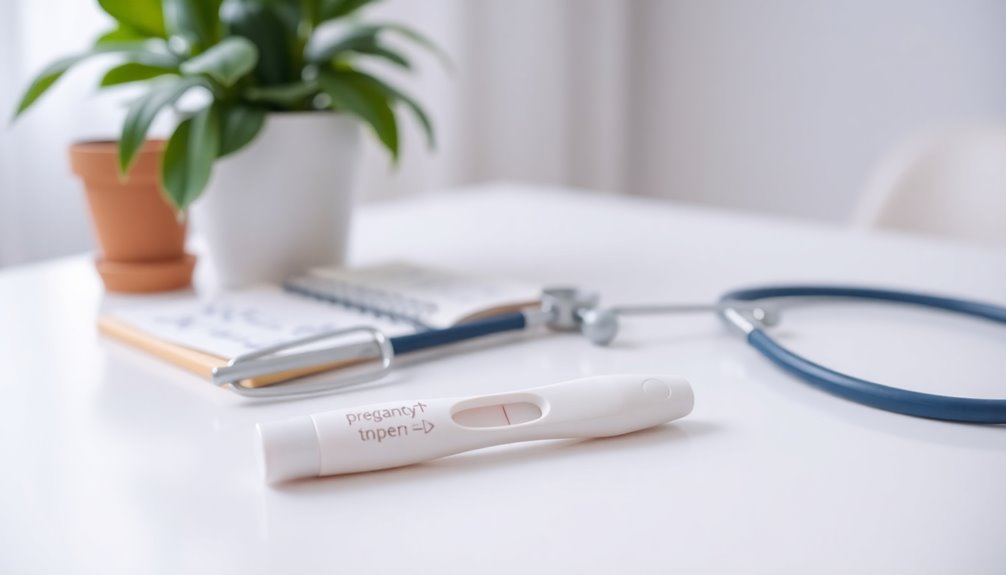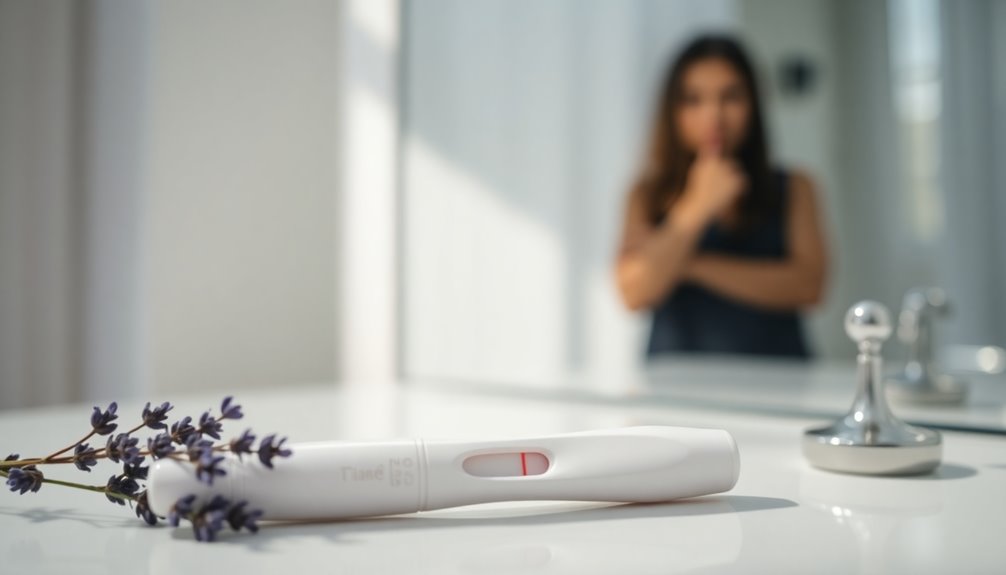Yes, you can get pregnant without having penetrative sex. Sperm can survive in the reproductive tract for days, so if ejaculation happens near the vaginal area, there's a risk of pregnancy. Even pre-ejaculate fluid can contain viable sperm. Additionally, there are assisted reproductive technologies, like intrauterine insemination and in vitro fertilization, that allow conception without traditional intercourse. This means virgin pregnancies can occur too. It's important to understand these concepts to grasp the realities of conception. Stay tuned for more insights on how pregnancy can happen beyond conventional methods.
Key Takeaways
- Pregnancy can occur through manual stimulation or ejaculation near the vaginal opening, even without penetrative sex.
- Sperm can survive in the reproductive tract for up to five days, increasing the chances of fertilization.
- Pre-ejaculate fluid may contain viable sperm, posing a risk of pregnancy without intercourse.
- Assisted reproductive technologies (ART) like IUI and IVF allow conception without traditional sex.
- Virgin pregnancies are possible, as 0.8% of women report becoming pregnant without vaginal intercourse.
Understanding Pregnancy Mechanics

When you think about pregnancy, you might picture penetrative sex as the only way it happens, but that's not the whole story.
Pregnancy can occur when sperm is introduced to the vaginal area through other activities, like manual stimulation or ejaculation near the vaginal entrance. Sperm can survive in your reproductive tract for up to five days, increasing the chances of fertilization if you ovulate during that time.
It's essential to know that your ovulation cycle typically occurs about 14 days before menstruation, making those days your most fertile period.
Even pre-ejaculate fluid can contain viable sperm, so there's a risk of becoming pregnant without vaginal intercourse.
Understanding these mechanics can help you make informed decisions about your reproductive health.
Non-Penetrative Methods of Conception

Have you ever considered how non-penetrative methods can lead to conception? These techniques, like ejaculation near the vaginal opening or using fingers and sexual toys to introduce sperm, can indeed result in pregnancy.
Sperm cells can survive in cervical mucus for up to five days, making these methods viable. Additionally, pre-ejaculate fluid may contain sperm, posing a risk even without full intercourse.
For those facing challenges like vaginismus, non-penetrative methods can be particularly beneficial.
Assisted reproductive technologies (ART), such as intrauterine insemination (IUI) or in vitro fertilization (IVF), also allow for conception without traditional intercourse by directly placing sperm in the uterus or fertilizing eggs in a lab.
This highlights the potential for conception beyond conventional methods.
Virgin Pregnancies Explained

Virgin pregnancies might sound surprising, but they do happen under certain circumstances.
You can get pregnant through non-penetrative sexual activities or even with assisted reproductive technologies.
Understanding the mechanisms behind these pregnancies can change how you view conception and virginity.
Definition of Virgin Pregnancy
While many people associate pregnancy primarily with penetrative sexual intercourse, virgin pregnancies challenge this conventional understanding. Defined as pregnancies occurring without such intercourse, studies show that 0.8% of women reported these cases.
Sperm can enter the vagina through non-penetrative activities, like manual stimulation or ejaculation near the vaginal opening, leading to potential conception. The concept of virginity varies, and pregnancy can still happen even when traditional definitions are upheld.
Medical professionals highlight that artificial insemination and assisted reproductive technologies can also result in pregnancies without sexual intercourse. Instances of virgin pregnancies, though rare, have been documented across cultural and religious contexts, underscoring the significance of understanding non-traditional methods of conception within the female reproductive system.
Mechanisms of Conception
Understanding how conception can occur without penetrative sex involves examining several mechanisms.
You can get pregnant without having sex if sperm is introduced to the vaginal area during non-penetrative activities. For instance, manual stimulation or ejaculation near the vaginal entrance can lead to pregnancy since sperm in pre-ejaculate fluid can fertilize an egg.
Notably, sperm can live in the female reproductive tract for up to five days, increasing the chances of fertilization if sperm is present during ovulation.
Additionally, assisted reproductive technologies (ART) like artificial insemination provide medical avenues for conception, further expanding possibilities for those seeking pregnancy without traditional intercourse.
Assisted Reproductive Technologies

Assisted Reproductive Technologies (ART) offer innovative solutions for those looking to conceive without traditional sexual intercourse.
One popular method is Intrauterine Insemination (IUI), where sperm is directly inserted into the uterus during ovulation, making it a less invasive option with costs starting around $300 per treatment.
If you're facing more significant fertility challenges, In Vitro Fertilization (IVF) might be the way to go. This technique involves retrieving eggs, fertilizing them in a lab, and transferring embryos back into the uterus, typically costing around $12,000 per cycle.
Additionally, Intracytoplasmic Sperm Injection (ICSI) is a specialized IVF technique, injecting a single sperm directly into an egg, often used in cases of male infertility.
These technologies empower your family planning choices.
Common Myths About Conception

You might think that pregnancy can only happen through vaginal intercourse, but that's not the whole story.
Many myths surround sperm survival and the possibility of conception without traditional sex, including the role of pre-ejaculate and virgin pregnancies.
Let's clear up these misconceptions and explore what really matters in conception.
Sperm Survival Misconceptions
While many people believe that sperm can survive outside the body for extended periods, the reality is quite different. Sperm survival is limited; they typically die within minutes when exposed to air.
Misconceptions persist that sperm can linger on surfaces like toilet seats or clothing, but that's simply not true. They need a specific environment to remain viable.
Also, pre-ejaculate fluid, or precum, can contain sperm, with about 16.7% of men having viable sperm present in this fluid, which may lead to pregnancy.
Under ideal conditions, sperm can stay active for about 20 minutes outside the body, but drying out or exposure to chemicals, like those in hot tubs, drastically reduces their chances of fertilizing an egg.
Pre-ejaculate and Pregnancy
How often do people overlook the potential risks of pre-ejaculate fluid when it comes to conception?
Many believe that pregnancy can only occur through ejaculation, but that's a misconception. Pre-ejaculate, often called precum, can contain viable sperm.
Studies show that about 16.7% of men have sperm present in their pre-ejaculate. Even a small amount can pose a risk for pregnancy, especially since sperm can survive in the female reproductive tract for up to five days.
Non-penetrative activities, like manual stimulation or using toys, can also lead to sperm transfer to the vagina.
Virginity and Conception Myths
What misconceptions surround virginity and conception? Many people believe you can't get pregnant without vaginal intercourse, but that's not true.
Virgin pregnancies, though rare, can happen through non-penetrative activities. If you're engaging in manual stimulation or ejaculation near the vagina, sperm can still enter the vaginal area.
Pre-ejaculate fluid can contain viable sperm, with about 16.7% of men producing it. This means there's a risk of becoming pregnant without vaginal intercourse.
Additionally, since sperm can survive in the female reproductive tract for up to five days, non-penetrative sexual activities during a woman's fertile window could lead to conception.
Understanding these myths can help clarify the realities of virginity and potential pregnancy.
Identifying Early Pregnancy Symptoms

Identifying early pregnancy symptoms can be essential for those who suspect they might be expecting. The first noticeable sign is often a missed period, typically occurring around four weeks after conception.
You might also experience:
- Nausea, commonly known as "morning sickness," which can start as early as two weeks post-conception.
- Breast changes, such as tenderness or darkening of the areolas, from hormonal shifts.
- Increased urination due to hormonal effects on kidney function.
- Fatigue, often linked to rising progesterone levels, occurring within the first month.
Recognizing these signs can help you determine if it's time to take a pregnancy test or consult a healthcare professional for confirmation and guidance.
Effective Birth Control Options

Recognizing early pregnancy symptoms is important if you're concerned about unintended pregnancy. To effectively prevent this, consider various birth control methods.
Hormonal contraceptives, like pills, have a typical effectiveness rate of about 91% when used correctly. For long-term protection, long-acting reversible contraceptives (LARCs), such as IUDs and hormonal implants, boast an effectiveness rate exceeding 99%.
Barrier methods, including male and female condoms, not only help in preventing pregnancy but also lower the risk of STIs when used consistently. If you prefer a natural approach, natural family planning can be about 76% effective with diligent cycle tracking.
Choosing the right method for you is vital for successful pregnancy prevention.
Emergency Contraception Explained

Have you ever wondered how to prevent pregnancy after unprotected sex? Emergency contraception (EC) can help you in this situation.
It's most effective when taken within 72-120 hours after exposure. Here are the main options:
- Hormonal pills (like Plan B One-Step and Ella) delay ovulation and can be taken up to five days post-intercourse.
- Copper IUD, inserted by a healthcare provider, offers over 99% effectiveness and can provide long-term birth control.
EC doesn't terminate an existing pregnancy, so it's safe for most individuals.
Remember, it's not a substitute for regular birth control and shouldn't be used frequently.
Knowing how to use emergency contraception can empower you to make informed choices about your reproductive health.
When to Seek Medical Advice

Wondering when to seek medical advice about your reproductive health? If you suspect you might be pregnant without having vaginal sex, it's essential to consult a healthcare provider. Missed periods or symptoms like nausea and fatigue warrant a discussion. Home pregnancy tests are helpful, but a doctor's blood test for hCG levels is more reliable.
If you've used non-traditional conception methods like home insemination, talk to a healthcare professional for clarity. Additionally, if you've had unprotected sexual contact, seek advice on emergency contraception within 72-120 hours.
| Situation | Action Required |
|---|---|
| Missed period & symptoms | Consult a healthcare provider |
| Home insemination concerns | Discuss with a healthcare professional |
| Unprotected contact | Seek emergency contraception advice |
| Regular check-ups | Maintain open communication |
Frequently Asked Questions
Can I Be Pregnant and Never Had Sex?
If you've never had sex, it's understandable to wonder if you could be pregnant.
While it's uncommon, it's still possible. Pregnancy can occur through non-penetrative activities or if sperm comes into contact with the vaginal area.
Additionally, assisted reproductive technologies could lead to pregnancy without traditional intercourse.
If you're concerned about your situation, consider taking a pregnancy test or consulting a healthcare professional for clarity and guidance.
How Rare Is Splash Pregnancy?
Imagine a delicate dance, where intimacy unfolds without the traditional steps.
Splash pregnancy is incredibly rare, with only about 0.5% of women reporting such occurrences.
Research shows that viable sperm can travel through pre-ejaculate or fingers during foreplay, leading to this unusual outcome.
Even during the fertile window, the chances remain low, emphasizing the importance of understanding these unconventional pathways while managing your own experiences and choices around intimacy and conception.
Can You Get Pregnant if Sperm Is Released Outside the Body?
Yes, you can get pregnant if sperm is released outside the body, especially if it lands near the vaginal area.
Sperm can survive for days, increasing the chance of fertilization if it reaches the egg during your fertile window.
Even precum may contain viable sperm, so engaging in activities like manual stimulation or using sex toys could lead to sperm transfer.
Always consider these possibilities if you're concerned about unintended pregnancy.
How Many Ways Can a Woman Get Pregnant?
Did you know that around 0.8% of women report pregnancies without vaginal intercourse?
There are several ways you can achieve pregnancy. Artificial insemination is a popular method, where sperm is directly inserted into the uterus.
Non-penetrative activities can also lead to conception if sperm reaches the vaginal area.
Additionally, assisted reproductive technologies like IVF allow for fertilization outside the body, providing options for women facing fertility challenges.
Each method offers unique possibilities!
Conclusion
In a world where knowledge is power, understanding that pregnancy can occur without traditional intercourse is essential. Whether through non-penetrative methods or assisted reproductive technologies, the possibilities are broader than many realize. So, when it comes to conception, don't let myths cloud your judgment. Stay informed, recognize the signs of early pregnancy, and know your options for birth control and emergency contraception. Your body, your choices—empower yourself with the right information!










